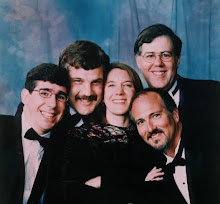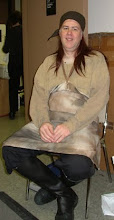Well, this has been a Mozart fall - I have had the opportunity to see 3 different productions of Nozze, 4 of Don Giovanni and 2 of Cosi - not to mention one each of Abduction, Idomeneo and Clemenza. The 3 productions of Nozze were from the ROH, the Met's wonderful new production which was broadcast in HD to movie theaters in October and the Winter Opera production which I saw this past weekend. I do not bring this up in order to compare the productions, that would not be fair - the Met's budget for Nozze is probably much more than Winter Opera's entire yearly budget. But it raises an important point - that is this - it is possible to do great opera and not spend hundreds of thousands of dollars. Yes, I know, opera is expensive - but, if ever there was a company who has perfected the art of doing great opera without a huge budget and who - it appears to me - know how to work with what they have and make the best of it - it is Winter Opera. Their "Marriage of Figaro" was a triumph. I really enjoyed it. Not that I don't have any quibbles (I always do) - but overall this was a terrific production performed by wonderful young singers. The pacing was good, the acting was good, the voices lovely. I hate to lift up one singer over another, but I have to say that Chad Armstrong as the Count really was a stand out in every way - acting and singing. I loved his act 3 aria it was exceptionally well done. This is not to say that the other members of the cast were not also quite excellent - because they were. So, again - fine job Winter Opera - thank you for a wonderful afternoon at what in my view is one of the greatest accomplishments in the history of opera - "Le Nozze di Figaro" by Mozart.
As promised I do need to list a couple quibbles - most of them are minor and really didn't detract from the production. I'll get this out of the way - the wigs really didn't work (especially the Count's, though the Countess' wig was pretty good). I have a few musical issues - why re-order the 3rd act? Why did this production choose to exchange the sextet and "Dove sono?" I found that disorienting. Mozart and da Ponte knew what they were doing - Act 3: duet - crudel, Hai gia vinta la causa, recit with Cherubino and Barbarina and then Dove Sono followed by the scene with the sextet. The re-ordering made no sense to me. I was pleased that over all there were no cuts - except for the finale of Act 3 and some recits here and there (not counting the usual cuts in act4 of the Marcelina and Basilio arias). I have to say, I don't get the cuts made to the Act 3 finale - they didn't save much time - maybe a couple minutes and they were jarring. But still, they were minor. Also in Act 3 - what happened to Cherubino at the end and why was he excluded from the party? And why was Antonio, the dirty drunk included in the dancing? This is supposed to be a triple wedding - but the groom from one of the couples was missing from the reception? Huh?
Those are minor - here is my major complaint. I know that this company needs to use a reduced orchestra - and this is fine and works without trouble for most operas. But to do a Mozart opera like Nozze without full woodwinds is almost heresy. This was the only thing that distracted and bothered me throughout the performance. I got used to the electronic harpsichord with reverb, I wasn't terribly bothered by a couple coordination problems between pit and stage and singers making a couple mistakes - that happens - but no oboe 2 and no bassoon 2 was really distracting - and at times when the music is at its most gorgeous. Example - "Porgi amor," without 2 bassoons (with a clarinet playing one of the bassoon parts (yuck - I love the clarinet, and the WO clarinets are outstanding, but as wonderful as they are they simply do not sound like bassoons!); "Dove sono" and "Hai gia vinta la causa without two oboes." Mozart was a brilliant orchestrator and his orchestrations should never be messed with. And we are talking about 2 players - I do not believe that Winter Opera, even with they noted and highly respected efforts to stay within their means could not have found a way to have afforded another oboe and bassoon. Heck I would have paid for one of those players myself. Please Winter Opera - the next time you do Mozart - 2 Flutes (maybe if the score calls for them); 2 oboes, 2 clarinets and 2 bassoons!
Lastly a complaint that is not directed at Winter Opera - but at productions of this opera in general. Why is it that two arias area almost always cut from act 4: Marcelina's "Il capro e la capretta" and Basilio's "In quegli anni..." Now as much as I like the Basilio aria - it is fun and funny - I have to admit it adds absolutely nothing to the plot. In fact the text is so odd that even after having sung it as a young voice student I have to admit I still don't quite understand what in the world he is talking about. It is a time out and I do understand why stage directors at that point in the opera see this aria as getting the way of the momentum. But Marcelina's aria is another story. Mozart as set two arias in opposition to each other - Figaro's "Aprite un po..." (sung wonderfully by WO'sTodd William Donovan - BTW Katy Lindhart was a wonderful Susanna) in which Figaro spends the aria complaining about women, how he doesn't understand them and how there is so much that is confusion about women he can't even begin to list everything. This aria is set up in opposition to Marcelina's "Il capro..." where she complains about men! It is a wonderful juxtaposition. Too often I hear complaints that opera and theater take the male perspective - but in this case Mozart and Da Ponte have provided a balanced look at how men and women, though drawn to each other, have such a hard time understanding each other. The net result is that the balance is shifted in the direction of the male view. BTW "Il capro..." takes 3 minutes and 11 seconds. This is not a criticism - the Met didn't include it either - in fact I have only seen two productions with these arias included and both were productions from England - an ROH production and the John Eliot Gardiner production from the 90's. There was a moment during the WO act 4 when Marcelina was on stage that I almost thought we were going to have the treat of hearing the wonderful Erin Haupt sing us this aria - but alas, she left the stage. I think we need a movement to restore at least this aria to performances of this opera.
In closing, this was a terrific performance - Winter Opera has done a great job. I also want to mention that one of things I really love about this company is their set designs. They create sets that can be quickly re-shaped for different scenes. Falstaff was the same. The set designer deserves an award! Thank you WO for a wonderful afternoon at the opera.


